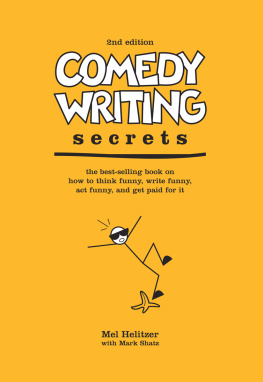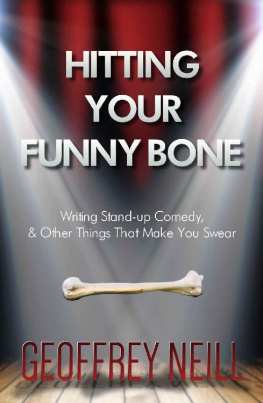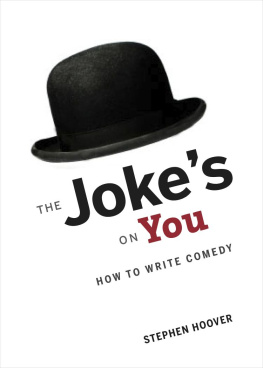2nd edition COMEDY WRITING secrets
the best-selling book on how to think funny, write funny, act funny, and get paid for it
Mel Helitzer
with Mark Shatz

COMEDY WRITING SECRETS, Copyright 2005 by Melvin Helitzer. Printed and bound in the United States of America. All rights reserved. No part of this book may be reproduced in any form or by any electronic or mechanical means including information storage and retrieval systems without permission in writing from the publisher, except by a reviewer, who may quote passages in a review. Published by Writer's Digest Books, an imprint of F+W Publications, Inc., 4700 East Galbraith Road, Cincinnati, Ohio 45236, (800) 289-0963. Second edition.
Other fine Writer's Digest Books are available at your local bookstore or direct from the publisher.
10 09 08 6 5
Distributed in Canada by Fraser Direct, 100 Armstrong Avenue, Georgetown, ON, Canada L7G 5S4, Tel: (905) 877-4411. Distributed in the U.K. and Europe by David & Charles, Brunel House, Newton Abbot, Devon, TQ12 4PU, England, Tel:(+44) 1626 323200, Fax: (+44) 1626 323319, E-mail: postmaster@davidand charles.co.uk. Distributed in Australia by Capricorn Link, P.O. Box 704, S. Windsor NSW, 2756 Australia, Tel: (02) 4577-3555.
Library of Congress Cataloging-in-Publication Data
Helitzer, Melvin.
Comedy writing secrets: the best-selling book on how to think funny, write funny, act funny, and get paid for it / by Mel Helitzer with Mark Shatz.
p. cm.
Includes index.
ISBN-13: 978-1-58297-357-9 (pbk. : alk. paper)
ISBN-13: 978-1-58297-685-3 (EPUB)
ISBN-10: 1-58297-357-1 (pbk. : alk. paper)
1. Wit and humor Authorship. I. Shatz, Mark. II. Title.
PN6149.A88H445 2005
2005014368
808.7 dc22
CIP
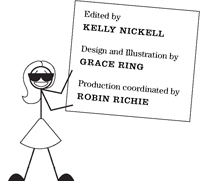

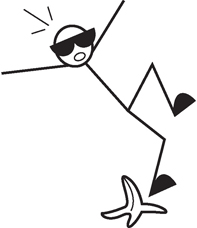
A MAGNUS HOPUS
Dedication
To Linea Warmke
and to
Ethan, his parents' favorite comic.

ABOUT THE AUTHORS
MEL HELITZER, a former Clio award-winning Madison Avenue ad agency president, is now a distinguished, award-winning journalism professor at Ohio University in Athens, Ohio. He was one of the first to teach humor writing at any university in the world. His course led to the publication of Comedy Writing Secrets in 1987, and the book is now the largest selling text on humor writing in the country.
Helitzer has written humor for print and broadcast productions as well as comedy material for such stars as Sammy Davis, Jr., Shari Lewis, Art Linkletter, Ernie Kovacs, and presidential candidate Adlai Stevenson. Many of his students are now professional comedians or humor writers for national publications. He is the author of seven books, including a bound-for-Broadway musical, Oh, Jackie! Her Father's Story.
MARK A. SHATZ is professor of psychology at Ohio University, Zanesville. In addition to teaching humor writing, he has extensive international experience as a teacher, speaker, and seminar leader on various topics such as motivation, death education, and interpersonal communication. Dr. Shatz has published numerous academic papers, including how to use humor to enhance instruction and learning. He is the author of KISSing Golf: The Keep It Simple (Stupid) Instructional Method, a humorous instructional book for beginning golfers.
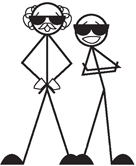
FOREWORD
And Now a Word From the Prof
Comedy is a lot like professional sports. Past successes are history. You get paid for today's hits. One difference is that in baseball, a .300 hitter gets paid a million dollars and the fans are deliriously happy all season. But a .300 batting average in comedy would get professional performers to go from boos to booze in a week.
With that kind of failure rate, you'd think any person who had reached the age of reason would take up plumbing. But the facts are that writing and performing humor is rising in popularity. And if you're successful, the money in comedy is so abundant that professional practitioners are like well-endowed actors in a porn movie You mean I get paid for doing that.
The biggest change in the humor industry in the last ten years has been the need for professional writers. There are just not enough qualified writers today to fill the increasing need. Besides the standard venues, more and more markets are begging for humor material: speeches, business newsletters, advertising, columns, talk shows, sales presentations, and everything from high-tech computer attachments to Hi, Mom greeting cards.
Comedy clubs had a ten-year fireworks display. While the worst ones closed from bad management and bad acts, the remainder are solid businesses, and the I'll do anything to get on stage neophytes are now secure enough to be unionized.
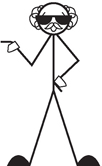
TV sitcoms also had their vicissitudes of popularity. The great ones lasted into syndication, and the worst ones were pulled after one or two seasons. In the meantime, the number of humor talk shows from Leno and Letterman to Jon Stewart and Conan O'Brien increased. And now every presidential candidate needs to make a guest appearance, not only to be toasted but also to increase his popularity by being roasted.
The formal study of humor in colleges has grown in geometric proportions despite the doubting colleagues who associate facetiousness with frivolity. The president of my university once told me he disdained humor, because he feared failure. I've heard some of your speeches, I told him. And I agree with you.
It's the fear of failure, however, that continues to be the biggest drawback. While 90 percent of us claim we have a sense of humor, the number of critics is 100 percent. I didn't think it was funny. Go argue.
Milton Berle ended his years appearing before senior citizens in Miami Beach. Once, a little old lady in the front row kept shouting, That stinks. I've heard it before.
Exasperated, Berle said, Lady, do you know who I am?
No, she said, but if you'll go up to the desk, they'll tell you.
The net result of all this is that if you really want to take the time and effort to learn how to write (and perform) humor, you've got to have a thick skin to go along with a nimble brain. Learn how to live with people throwing dirt at you.
One day a donkey fell into a well. The farmer couldn't get him out, so he knew he had to cover him up. He called in his neighbors, and they all started to throw dirt down the well, but instead of burying the animal, the donkey would shake the dirt off and take a step up. Pretty soon, the pile of dirt got so high that the donkey stepped over the edge of the well. Moralists use this story to preach that all our troubles can be stepping stones, that we shouldn't give up; instead shake it off and take a step up. Comedians, however, note that as soon as the disdained donkey got to the top he ran over and bit the farmer. Their moral is that if something goes wrong, try to cover your ass. It can come back and bite you.

